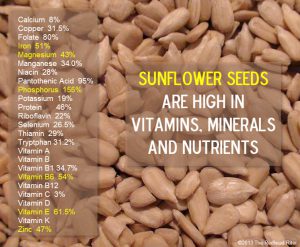Sunflower seeds are the gift of the beautiful sunflower that has rays of petals emanating from its bright yellow, seed-studded center. But we are also caring for health right ? Unfortunately, you can’t just make a blanket statement about the healthiness of a single food without addressing a diet as a whole. Let’s consider the pros and cons carefully. We’ll use 1/4 cup as our serving amount.
Sunflower is a tall, erect, herbaceous annual plant belonging to the family of Asteraceae, in the genus, Helianthus. Its botanical name is Helianthus annuus. It is native to Middle American region from where it spread as an important commercial crop all over the world through the European explorers.
Lets discuss Health benefits of sunflower seeds.
- Delicious, nutty, and crunchy sunflower seeds are widely considered as healthful foods. They are high in energy; 100 g seeds hold about 584 calories. Nonetheless, they are one of the incredible sources of health benefiting nutrients, minerals, antioxidants and vitamins.
- Very high in Vitamin E (also almost your entire RDA)
- Exceptionally high in Vitamin B1 (almost your entire Recommended Daily Amount (RDA); indeed, it is one of the richest food sources in existence for this vitamin)
- Much of their calories come from fatty acids. The seeds are especially rich in poly-unsaturated fatty acid linoleic acid, which constitute more 50% fatty acids in them. They are also good in mono-unsaturated oleic acid that helps lower LDL or “bad cholesterol” and increases HDL or “good-cholesterol” in the blood. Research studies suggest that Mediterranean diet which is rich in monounsaturated fats help to prevent coronary artery disease, and stroke by favoring healthy blood lipid profile.
- Sunflower kernels are one of the finest sources of B-complex group of vitamins. They are very good sources of B-complex vitamins such as niacin, folic acid, thiamin (vitamin B1), pyridoxine (vitamin B6), pantothenic acid, and riboflavin.

Cons of Sunflower Seeds.
There is only one significant con, but it’s a big one:
-
- Sunflower seeds are very high in omega-6 fatty acids, which prevent you from effectively utilizing omega-3. Omega-3 has been proven to be very important in brain and heart health, as well as in decreasing inflammation and improving hormone response.
- 1/4th cup contains 11.75 g of omega-6, and only trace amounts of omega-3.
Nutritionists recommend that the omega-3-to-omega-6 ratio should be at least 1:4, and there are probably health benefits up to 1:1. In order to get enough omega-3 to balance consumption of 1/4 cup of sunflower seeds (using the 1:4 ratio), you would need to eat:
-
-
-
- 5 ounces wild-caught salmon; OR
- 7.5 ounces sardines; OR
- 1 lb Dover sole; OR
- 2 lbs shrimp; OR
- 2.5 lbs tilapia
-
-
But this assumes that the sunflower seeds are your only source of omega-6, which they almost certainly would not be!So is it worthwhile to consume sunflower seeds? Not to most people. Get your vitamin B1 and E from other sources.

